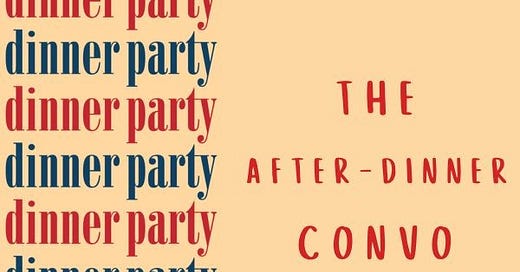The After-Dinner Convo with Corey Mintz
If Corey Mintz, food reporter + hospitality consultant could be anywhere, he wouldn’t be lying on a beach or hiking through the rainforests. He would be at the dinner party with friends.
Welcome to The After-Dinner Conversation, a new written series from Dinner Party. Here, I linger a little longer with the authors, tastemakers, and creatives who inspire what we cook, how we gather, and the spaces we call home. Think of it like a second glass of wine and an unhurried chat by candlelight.
To celebrate National Dinner Party Day, I’m delighted to launch the very first edition of The After-Dinner Conversation, a new written interview series from Dinner Party. For our debut, I posed 10 questions to the author of How to Host a Dinner Party, who has hosted more than 200 gatherings both for his Toronto Star column Fed and in his own home.
We talked about everything from guest list alchemy and hosting insecurities to Ruth Reichl’s unexpected influence and why the first 15 minutes of any gathering are the most crucial. If you’ve ever fretted over lighting dimmers or wondered whether takeout can count as hospitality, this conversation is for you.
1. You’ve hosted well over 200 dinner parties over the years—both for your Toronto Star column “Fed” and in your own home. At what point did you realize there were universal truths, or common mistakes, we all make when inviting people into our homes?
Probably somewhere around 100 dinners. So two years in. I started to see the patterns; the doubts and insecurities people have about being a guest, the assurances we often need.
2. You write that “cleaning up during the party is the worst thing a host can do.” What are some other subtle things hosts do that accidentally break the spell of a good evening?
Unsubtle transitions can break the spell. I have a five-year-old so we see it expressed literally with them. Even if it’s time to stop one fun thing and start another, like leaving our play-doh to go sledding, drawing attention to the shift can result in kids revolting against the change. At a dinner party, this takes the form of adjusting the lighting or music too quickly. Dials and dimmers should be used like a surgeon, not a butcher. Or interrupting someone’s story to draw attention to the food you’re serving. Or talking about your worries as a host (which is just fishing for guests to tell you what a good job you’ve done). Or looking at your watch or talking about what time it is, even if it’s too observe that you didn’t’ notice how late it’s gotten because you were having such a good time. As soon as you say that, everyone is thinking about overstaying their welcome.
3. In a time when entertaining has become increasingly performative - hello, Instagram! How can we return to the spirit of relaxed, meaningful hosting?
That’s easy. No phones at the table. A host doesn’t have to enforce this, like a publicist taking away phones at a Marvel movie screening. It starts with the host not having their phone in their hand or on the table (as a lot of people do). This sends a signal to guests that it would be impolite for them to do so, even if they do at home. And it helps to not hype things up in advance, posting online about what you’re cooking or how stressed you are. That only increases expectations for your guests, or alienates friends who weren’t invited.
4. How do you approach guest lists? You talk about mixing personalities with intention. Can you share a memorable example where the right (or wrong) guest combo changed everything?
My strategy is always to invite people who would have a good time together even if I wasn’t there. When it backfires, the problem is often that there is a guest/friend who may be fascinating one-on-one, but they are too aggressive for a group of six. Extroverts are wonderful, but some people just want an audience.
5. How did Ruth Reichl inspire you to become a professional dinner party host?
I interviewed her in my home and made her lunch. My editor was happy with the piece, but more interested in the blog post (this was 2009) I wrote about what I cooked and how it felt to host my idol. She asked if I could do this on a weekly basis. After a few rounds of interviewing while cooking, I realized that it would help to have more people at the table. That evolved quickly into a dinner party where I could fade into the background, show people a good time and get more interesting material about how interview subjects engage socially.
6. What would you say to someone who’s afraid to host because they think their space or cooking isn’t “good enough”?
“Good enough” is a grey area. If that means “not fancy enough”, that’s insecurity. If our friends like us, they want to spend time with us. It doesn’t matter who has a cleaner home or better renovated kitchen. If it’s about space, that matters. Guests need to be comfortable. Calculating how many people can comfortably sit around a table will make or break an evening. My table seats six comfortably, or eight if we squeeze in.
7. In your book, you talk about how the golden rule for dinner parties supersedes the original golden rule. What does that mean?
Wow. You really read this book. The golden rule, for anyone who needs a reminder, is to do unto others as you would have them do unto you. As a host, that’s still a little too focused on you. For example, I love talking about gardening. My wife Victoria likes talking about White Lotus. It would be inconsiderate to assume that my guests want to be treated as I want to be treated. If the goal is to ensure that everyone has a good time, the challenge is to learn how guests want to be treated, and what interests them. An attentive host learns quickly who likes having their glass refilled, versus who would rather a bottle be left on the table where they can reach it. Or who is ready to talk politics versus who needs a second drink before moving beyond small talk.
8. How can we throw a successful dinner party if we’re not a great cook? {Asking for a friend.}
Cooking is not a prerequisite for hosting. If a friend invites me to dinner, I’m looking forward to spending an evening with them. If they served take-out pizza, I would be thrilled.
9. What is supposed to happen in the first critical 15 minutes, as you call them?
Those first fifteen minutes are about easing everyone in. A display of confidence is essential. Many people bring their insecurities to unfamiliar social situations. They need two things to make them more comfortable — something to drink and someone to talk to. Most of us, once we’ve got something to do with our hands (half of a drink’s value) and someone is paying attention to us, we are on the track and no longer worrying about feeling left out, that common fear that causes us too often to avoid events that might be fun.
10. You’ve cooked for strangers, friends, and probably a few wild cards. Who would be your dream dinner guest, living or dead, and what would you serve?
Stan Lee, Joan Lee, Jack Kirby and Roz Kirby. As collaborators in the 60s, Stan and Jack created Iron Man, the Hulk, the Fantastic Four, the X-Men, the Black Panther, Dr. Doom, the Avengers and so on. They feuded constantly, Jack resentful over Stan’s share of the credit, compensation and creative control, and didn’t speak to him for most of the 70s and 80s. Both men were married until their deaths, with Joan and Roz supporting their husband’s careers not just emotionally, but often physically doing work like inking or lettering. I would love to see the two couples together around a dinner table. I would bake challah and smoke a brisket. And I imagine that as a foursome, they would find so much more common ground than Jack and Stan were able to maintain as they argued about contracts.
Corey Mintz is the author of How to Host a Dinner Party, and you can find him at the following links:
https://www.instagram.com/coreymintz/
https://bsky.app/profile/corey-mintz.bsky.social
Talk to you later, Bye!







